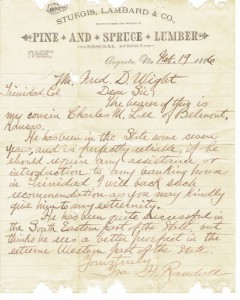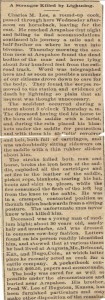
Every family history researcher hopes diligence and persistence will bring forth enough details of an ancestor’s life to fill out a void on the family tree. There is always hope that serendipity will produce unexpected history gold in letters, diaries, or journals. Charles Merrill Lee (1860–1887) is one of those relatives who stand in the background of family research until the odd paper comes to hand or an old memory nags at the brain.
My grandmother always called him “Uncle Charlie.” Born in Maine, Charlie was four years younger than her father Fred Lee. Uncle Charlie was seldom mentioned, in my presence anyway, and usually in regretful tones. My questions were unanswered, and a search of the usual public records yielded little information.
Then I unearthed a few old letters, a postcard from his mother, and an old, yellowed (aren’t they all?) newspaper clipping.
From census records, I knew that he had gone to southwestern Kansas with my grandparents and my grandmother’s brother Mark and sister Genie. The letter of introduction written by Cousin Ira H. Randall to a Colorado banker told me that he had then spent several successful years in Colorado, but whether or not it was in lumbering is only an educated guess. His last job was as a cook. Charlie remains a silhouette on the family tree, coming alive only in the matter of his death.
Charlie was a cook on a cattle drive, and when the drive ended he headed for his brother Fred’s farm in southwestern Kansas. As he passed through Arapahoe, Colorado, a thunderstorm came up. Caught in the open, he dismounted, put his revolver and ammunition on the ground with his blanket, settled his saddle over everything, and sat down on it. He tied the horse to the saddle’s horn and draped his poncho over himself and the saddle.
He never knew what hit him. The lightning bolt killed both Charles and his horse, set off the ammunition, and set fire to saddle and blanket.
Strangers from the town discovered the bodies and did their best for them until family could be notified. Burial (of both, I assume) was in Arapahoe.
Uncle Charlie did everything right, but still brought himself and the horse he rode in on to their unexpected ends.
While I lack the usual public records, I have these few original, personal sources. I know where and how he lived his short life and with whom, that he was loved and remembered, but I have not one photo with him identified. No one mentions his name in hushed tones now. He may be included in my family photo albums, but he’s just one more figure in a photograph to me. Serendipity, where art thou?



Ah! The Lee family of Colorado – He must have been one of my own! This story sounds all too familiar to me, and rings all to true. Bittersweet.
Are we kin?
Charlie was only passing through Colorado. He and Fred were born in Maine to a long line of Maine Lees, descendants of William Lee (1728-1795) of Leeds, England. While there is a Robert E. Lee in the family, there’s no connection to the General, either!
A bit of a correction. Because of the personal info you’ve unearthed, Charlie is now MORE than a figure in the back row of an old group picture or a fleeting data point between censuses. He is as much Charlie of this world as he can be. That is the very best we can do in doing this work.
What a great piece of history.
I am related to alot of the Wight family in MA, I will have to see if this gentleman was part of the family tree!
Don’t you just love the detail is some old news stories. I have one on the death of a first cousin once removed who was killed in an auto accident in 1921 that leaves little to the imagination. Our ‘sensibilities’ have become so ‘refined’.
Ross, by the time I was born, my own hometown newspaper had become a victim of those “refined sensibilities”, which is why I’m delighted to be able to read recently digitized, turn-of-the-century editions online which leave very little to the imagination in accounts of events resulting in death. One example: instead of reporting that one of my great-aunts simply “died at the family home”, the paper told how she engineered her death by pouring (kerosene?) on and around the family’s outhouse, then went inside and lit a match. Unfortunately (for her), other family members were able to pull her out, still alive but badly burned over most of her body. Hospitals weren’t an option then, so she was taken into the house, where she suffered (horribly, I imagine) for 3 more days. Until I found the obit, I only knew my mother’s version, that her aunt had “torched herself in the toilet”, and for years I assumed that meant that she’d set fire to herself in the bathroom!
I think it is fair to say that no one who reads your account of Charlie’s death will forget it, or him. Something of him comes through even in the few things you have. I lived in Colorado, and any rainstorm was something to be feared. I called my mountainside plot “Lightning Ridge”, it had so many strikes. Once, one jumped from a tree and struck the car I was sitting in, waiting for the storm to abate. I can picture Charlie’s misery sitting in that storm trying to keep his gear dry. I can’t help but wonder what his intention was that day, and what his hopes were. The kinds of things we almost never really know about our ancestors.
Ira H. Randall was my grandfather. Thank you for posting.